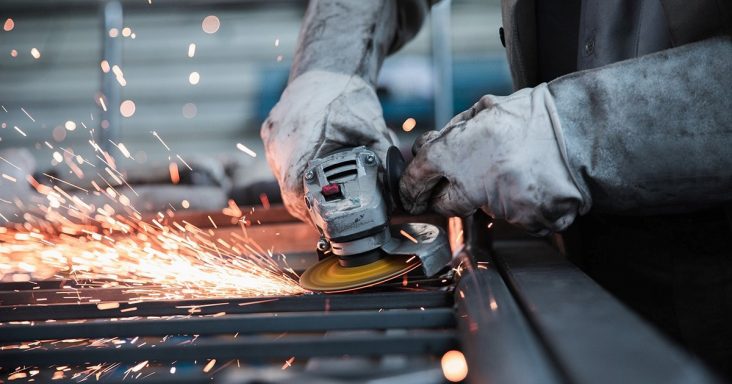Walmart pushes U.S. manufacturing support with $350 billion investment
by March 3, 2021 3:37 pm 1,678 views

Walmart on Wednesday (March 3) announced a new $350 billion commitment to support 750,000 U.S. manufacturing jobs over the next decade. The pledge builds on the $250 billion commitment in 2013 for purchasing American-made goods.
The pledge includes a goal of purchasing $350 billion in products made or assembled in the U.S. and the launch of American Lighthouses, a collaborative effort to sustain manufacturing in strategic regions around the country. The tally for Walmart’s investment to support U.S. manufacturing jobs will exceed $600 billion over two decades.
“U.S. manufacturing really matters,” John Furner, president & CEO of Walmart U.S., who made the announcement at Techtronic Industries (TTI) in Anderson, S.C. “It matters to our suppliers, to entrepreneurs and to the environment. It matters to our customers – more than 85% of which have said it’s important for us to carry products made or assembled in the U.S. And most of all, because of the jobs it brings, it matters to American communities and the people who live in them.”
There is no independent method to verify how much Walmart spends with manufacturing or how many jobs are created or retained. Walmart has not given specifics on its spending toward the 2013 goal to purchase an additional $250 billion on goods made, grown or assembled in the U.S., but Furner did say the retailer is on track to deliver that goal by 2023.
‘AMERICAN LIGHTHOUSES’
Techtronic employs 1,500 people and assembles products sold in Walmart stores and on Walmart.com. Furner said because of Walmart’s commitment, Techtronic Industries plans to double their headcount over the next two years.
He said the $350 billion investment is an extension of Walmart’s support that will focus on the following priority categories: textiles, plastics, small electrical appliances, food processing, pharmaceutical and medical suppliers and goods not for sale.
Walmart said the new concept of American Lighthouses will support manufacturing in a sustainable way for the long-term. The retail giant will unite key stakeholders in specific regions of the country to identify and overcome barriers to U.S. production. Walmart said these Lighthouses will bring together participants from the supplier community, including manufacturers and non-government organizations, as well as others from academia, government and local economic development groups.
The Walmart statement included comments from U.S. Senators.
“I am passionate about bolstering the American supply chain and creating more high-paying jobs in South Carolina and for folks all across the country. Congratulations and thank you to Walmart for the great impact you will continue to make on our nation’s economy,” noted U.S. Sen. Tim Scott, R-S.C.
U.S. Sen. Chris Coons, D-Del., said his state is home to Zenith Home Corp./Maytex Manufacturing that assembles home fashion products sold at Walmart. Coons said the business has been strengthened because of Walmart’s commitment and help from Delaware Manufacturing Extension partnership. He is excited to see the model replicated nationwide.
Furner said the impact of this commitment goes beyond products and jobs because it could result in an estimated reduction of approximately 100 million metric tons of CO2 emissions by making the products closer to consumers.
He said the new goal will also provide the opportunity for 9,000 entrepreneurs to become Walmart suppliers and sellers through its Open Call events which will be held virtually again this year on June 30.
“Open Call is one of my favorite days of the whole year at Walmart. We invite basically anyone with a shelf-ready product that supports American jobs to pitch it to us,” Furner said.
RESHORING REALITIES
Harry Moser, founder of Reshoring Initiative, applauds Walmart for its efforts to support U.S. manufacturing. He said COVID-19 accelerated a reshoring trend that started a few years ago. He said a recent survey of 750 companies in North America indicates 69% were likely or extremely likely to reshore overseas operations to shorten the supply chain. Medical equipment reshoring cases in the first six months of 2020 were double the full-year 2019 figure. Longer-term, the most active industries in reshoring have been transportation equipment, machinery, electronic products, and appliances.
To reshore more jobs, Moser says he would like to see the U.S., Canada, and Mexico collaborate more on trade matters.
“The United States trade agreement with Mexico and Canada (USMCA) is a good start; it may bring back 50,000 manufacturing jobs, which is not a lot. We would like to see the U.S., Mexico, and Canada get together and agree to bring back two million manufacturing jobs from Asia,” he said.
The U.S. has a critical need for more qualified, trained workers to increase the country’s capacity to reshore, and needs to continue increasing productivity to be more price-competitive with comparatively low wages overseas, Moser added.
There were an estimated 12.217 million U.S. manufacturing jobs in January, down from 12.792 million in January 2020, according to the U.S. Bureau of Labor Statistics. Jobs in the sector fell to 11.414 million in April 2020 following a broad shutdown of the U.S. economy because of COVID-19. Jobs in the sector peaked at 19.553 million in June 1979.
